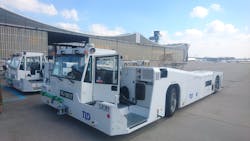TaxiBot Takes Step Towards Enhancing Airports' Future
TLD, IAI entered in an agreement with KSU from India for operating TaxiBot vehicles in New Delhi and Mumbai airports.
As the Indian aviation market is witnessing explosive growth in both aircrafts and passengers traffic (+20 percent per year over the past three years), Mumbai and New Delhi airports are set to get more environment friendly with TaxiBots. TaxiBot is a semi-robotic vehicle which connects to the aircraft and is controlled by the pilot to taxi the airplane from its airport’s parking position to the runway with no use of the aircraft’s main jet engines. They can reduce air pollution by reducing emissions from aircraft’s engines as well as fuel consumption by a whopping 85 percent.
Additionally, to these fuel and emissions savings, taxiing with the TaxiBot reduces noise levels by 60 percent and foreign object damage by 50 percent as foreign objects can’t be sucked into the aircraft engines if they are not running.
As well, TaxiBot’s additional benefit is the streamlining and increased throughput of aircraft entering and exiting the terminal area. The Indian government regards the TaxiBot as a significant means for addressing the grave air pollution issues in airports, which are exacerbating due to the continued growth of air transportation.
TaxiBot are manufactured by TLD in their French factory.
Shaul Shahar, IAI EVP and General Manager of IAI’s Military Aircraft Group, commented, “We regard the contract with KSU as a further step in our close collaboration with India in a broad range of areas. We trust the TaxiBot will prove itself effective in reducing air pollution, which is intensifying due to the fast growth of India’s aviation market with the significant savings in fuel, FOD (Foreign Object Damage) and improvement in the gates congestion. The TaxiBot is another example of IAI’s capability in developing unmanned vehicles of all kinds and customizing breakthrough products to customers’ needs. We believe this agreement will open the path for many more significant contracts for this product worldwide.”
Antoine Maguin, Chief Executive Officer of TLD Group, said, “We at TLD, with our local partner Millennium, are very excited to participate to the deployment of TaxiBot, in real life conditions, on the fast expanding Indian aviation market. After years of development, heavy testing and certification, for which TLD has worked in cooperation with IAI, the TaxiBot concept and machines have become a reality. It will bring significant benefits to the aviation industry, and in particular strong fuel savings, and to the whole community by improving aviation and airports environmental footprint”.
Yogesh Sethi, Founder of KSU Aviation Private Limited, said, “KSU Aviation Private Limited is excited to be associated with TaxiBot Project and proud to commence commercial operations of the TAXIBOT first time in the world in India. This will be a huge moment of pride and glory for Indian aviation as well as KSU aviation to lead by example how aircrafts will be moved on ground in the future. The use of TaxiBot at Indian Airports in the coming five years will bring about a saving of 1.5 Billion dollars to the Indian airlines and further reduce the environmental damage of greenhouse gases by 4 million tons. This would significantly impact the growth of Aviation industry in India.”
